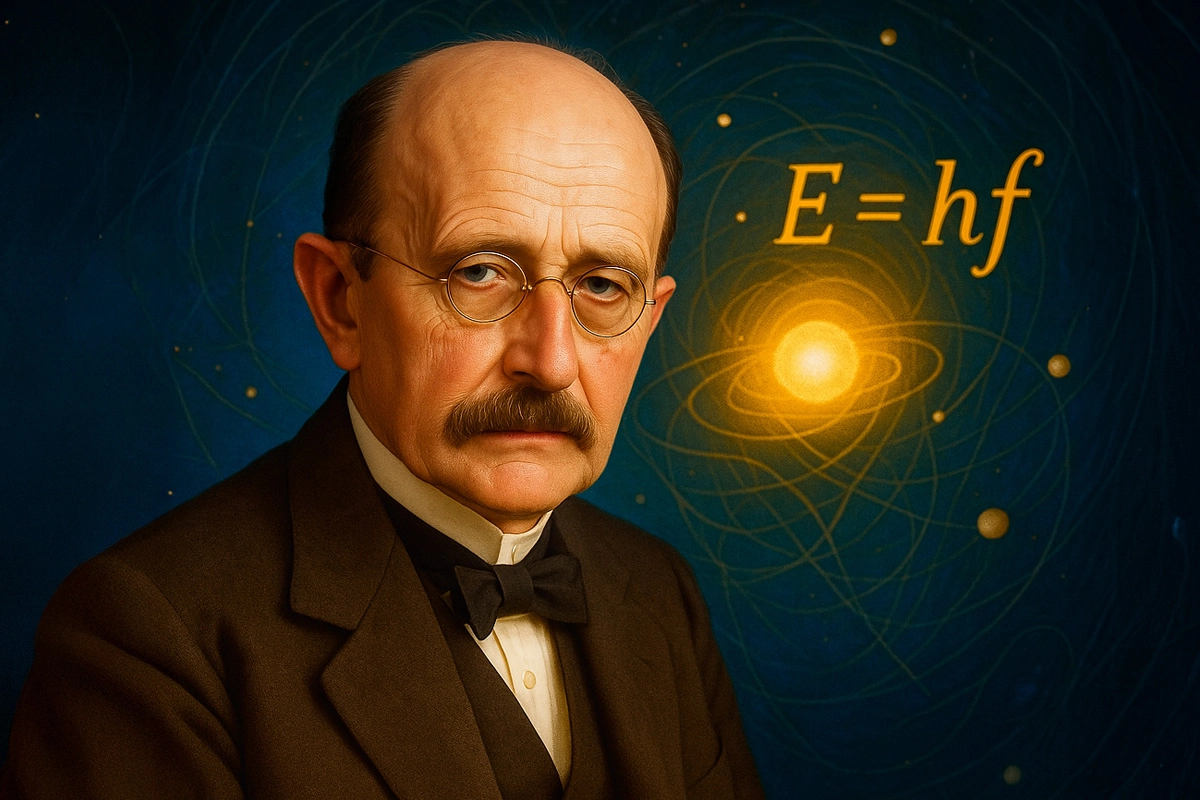
What is in this article?
The German physicist Max Planck, who revolutionized the world of science with Quantum Theory, made numerous groundbreaking contributions throughout his life. Awarded the Nobel Prize in Physics for his groundbreaking work, Max Planck is known not only for Quantum Theory but also for foundational contributions such as Planck’s law of black-body radiation and the Planck constant, both of which remain essential to modern scientific progress. Let’s take a closer look at Max Planck’s groundbreaking work as we explore who he was.
Who Was Max Planck? Academic Career and Achievements
Throughout a life marked by hardship and personal tragedy, Max Planck remained deeply committed to his scientific work. Born in Germany in 1858, Max Planck came from a family of scholars, as both his father and grandfather were professors. He began his education in Kiel and continued it in Munich due to his father's academic appointment. Although he showed great promise in music, he chose to build his career in physics and mathematics. In 1874, during his undergraduate studies at the University of Munich, he had the opportunity to study mathematics under Gustav Bauer and physics under Philipp von Jolly and Wilhelm Beetz. One of the reasons that led him to leave the University of Munich was the claim he was told there: that physics was already a complete science with no room left for further development. Starting in 1877, he chose to continue his education at the University of Berlin. There, he studied under influential figures such as Helmholtz, Weierstrass, and Kirchhoff, all of whom had made significant contributions to the scientific world.
During his time in Berlin, Max Planck became acquainted with Rudolf Clausius’s work on thermodynamics, which later inspired him to return to Munich and focus his research in this field. In 1879, he received his doctorate with a dissertation titled “The Second Law of the Mechanical Theory of Heat”. Although he worked in an unpaid position for a while and faced many financial difficulties, Max Planck was appointed as an extraordinary professor of theoretical physics in Kiel in 1885 and managed to leave his economic hardships behind. After the death of Kirchhoff in October 1887, Max Planck was appointed to take his position. About a year later, he was named extraordinary professor of theoretical physics at the University of Berlin and became the head of the Institute for Theoretical Physics. In 1892, he was promoted to full professorship.
During his time in Berlin, he carried out research that would eventually make him one of the most important scientists in history. In 1900, he published his work that became known as Planck’s radiation formula, rejecting classical physics and introducing the concept of energy quanta. By challenging the very knowledge he and the scientific community had long accepted as true, Max Planck took a major risk and was awarded the Nobel Prize in Physics in 1918 for his groundbreaking work. His work on quantum mechanics laid the foundation for the studies of Einstein, Poincare, Niels Bohr, and many other scientists.
Despite his achievements, Max Planck lived through both world wars and faced deep personal tragedies. He had four children with his first wife, whom he lost in 1909. Not long after remarrying, his son Karl died in 1916, followed by his daughters Margarete in 1917 and Emma in 1919. His only surviving son, Erwin, was executed in 1945. During World War II, Max Planck refused to leave Germany and resisted the Nazis with the limited means available to him. In 1943, Max Planck was forced to leave Berlin and lost his home along with a large portion of his work in an air raid. Despite his age, he continued working until his death to help rebuild German science after the war.
.webp)
Max Planck and the Quantum Theory: A Revolution in Physics
Max Planck’s greatest contribution to the world of science, quantum theory, led to a reevaluation of many ideas that had previously been accepted as true. Although Max Planck never directly answered the question “What is Quantum Mechanics?”, his work played a key role in the development of the field. The inspiration behind Planck’s groundbreaking research came from his observations on blackbody radiation. When solid materials are heated, they emit radiation. Focusing on this phenomenon, Planck developed the Planck radiation law, which linked the energy of radiation to its frequency. According to Planck’s quantum theory, the following can be stated:
Different atoms and molecules can emit or absorb energy only in discrete amounts. He called the smallest amount of energy that can be emitted or absorbed in the form of electromagnetic radiation a “quantum.”
The energy of the absorbed or emitted radiation is directly proportional to the frequency of the radiation.
To express this theory mathematically, he introduced the Planck constant, denoted as h, with a value of 6.626×10 –34 Js. The energy of a photon is equal to the product of the Planck constant and its frequency. As a result of this work, the Planck equation E = h.v was established.
.webp)
Max Planck’s Work and Scientific Discoveries
Max Planck laid the foundations of modern physics through his work and contributed to the development of quantum mechanics alongside scientists such as Einstein, Heisenberg, and Bohr. He made lasting and significant contributions to the scientific world, including the Second Law of Thermodynamics, blackbody radiation, and the Planck constant. At the beginning of his career, he was told that almost everything in physics had already been discovered and that new breakthroughs were impossible, yet he played a key role in the advancement of modern physics as a response to this belief. Even when he had to abandon what he previously knew during his research, he made fearless discoveries that earned him a lasting place in history.
.webp) The Planck Constant and the Concept of Energy Quanta
The Planck Constant and the Concept of Energy Quanta
Planck’s most valuable work was undoubtedly in the field of quantum mechanics. As a result of his studies on blackbody radiation, he discovered that energy is emitted in discrete units. He called these smallest packets of energy “quanta.” In doing so, Planck introduced the concept of energy quanta. However, it was also necessary for him to express his findings mathematically. The Planck constant he proposed in 1900 is a fixed value used in quantum mechanics to describe the relationship between energy and frequency.
The letter “h” is used to represent the Planck constant, which has a value of 6.626 × 10⁻³⁴ J·s (joule-seconds). This constant indicates that energy is emitted in discrete units, known as quanta. Using the Planck constant, the energy of a photon can be calculated with the formula E = h.f.
 Quantum Theory and the Development of Solar Energy Technologies
Quantum Theory and the Development of Solar Energy Technologies
Through the research that led to quantum theory, Max Planck made discoveries that laid the foundation for many modern technologies used today. One of the technologies that became better understood and further developed as a result of Planck’s work is solar energy. In simple terms, the use of solar energy is made possible by the photovoltaic effect of light. This process allows photon energy to be converted into electron energy, which can then be used as electrical energy. For more detailed information about photovoltaic systems, be sure to check out our article titled “What is Photovoltaic System?” Quantum mechanics is used to explain how this system operates. With the help of quantum mechanics, to which Max Planck made major contributions, atomic and subatomic interactions can be better understood, enabling the development of various technologies, including solar energy. You can learn more about solar energy in our article titled “What is Solar Energy?”
Don’t forget to check out our carefully prepared blog articles, where you can explore not only the inspiring life stories of scientists but also many fascinating topics in popular science.

 Online Services
Online Services Application Inquiry
Application Inquiry Pay Assurance Fee
Pay Assurance Fee Query Installation Number
Query Installation Number Compensation Fee Inquiry
Compensation Fee Inquiry Automatic Payment Order Inquiry
Automatic Payment Order Inquiry Partnership
Partnership

.webp)
Leave a Comment